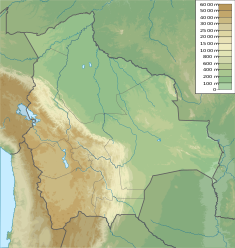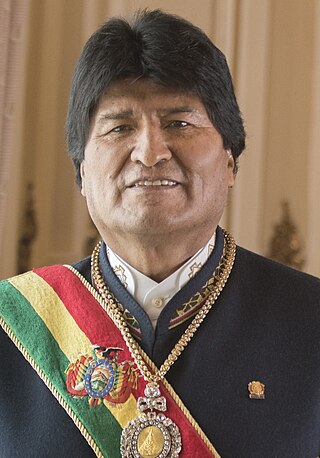
Juan Evo Morales Ayma is a Bolivian politician, trade union organizer, and former cocalero activist who served as the 65th president of Bolivia from 2006 to 2019. Widely regarded as the country's first president to come from its indigenous population, his administration focused on the implementation of left-wing policies, improving the legal rights and socioeconomic conditions of Bolivia's previously-marginalized indigenous population and combating the political influence of the United States and resource-extracting multinational corporations. Ideologically a socialist, he has led the Movement for Socialism (MAS) party since 1998.
Bolivia's drinking water and sanitation coverage has greatly improved since 1990 due to a considerable increase in sectoral investment. However, the country continues to suffer from what happens to be the continent's lowest coverage levels and from low quality of services. Political and institutional instability have contributed to the weakening of the sector's institutions at the national and local levels. Two concessions to foreign private companies in two of the three largest cities—Cochabamba and La Paz/El Alto—were prematurely ended in 2000 and 2006 respectively. The country's second largest city, Santa Cruz de la Sierra, relatively successfully manages its own water and sanitation system by way of cooperatives. The government of Evo Morales intends to strengthen citizen participation within the sector. Increasing coverage requires a substantial increase of investment financing.
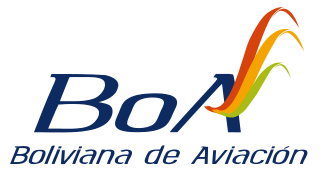
Boliviana de Aviación, legally incorporated as Empresa Pública Nacional Estratégica Boliviana de Aviación and commonly known as BoA, is the flag carrier airline of Bolivia and is wholly owned by the country's government. Founded in October 2007 and headquartered in Cochabamba, it operates most of its domestic network out of its primary hub at Jorge Wilstermann International Airport and maintains focus cities at El Alto International Airport and Viru Viru International Airport. Almost all international flights, including long-haul services to Madrid and Miami, operate out of Viru Viru airport in Santa Cruz de la Sierra due to the severe limitations of El Alto International Airport in La Paz, located over 4,000 metres (13,000 ft) above sea level.
Julieta Mabel Monje Villa is a Bolivian politician and lawyer. She was named Minister of Environment and Water on January 23, 2010.

The Ministry of Cultures, Decolonization, and Depatriarchalization is the ministry of the government of Bolivia that provides for the preservation and protection of the cultures and artistic expressions of the indigenous peoples of Bolivia as well as promotes the country's tourism sector and process of decolonization and depatriarchalization.

Luis Alberto Arce Catacora, often referred to as Lucho, is a Bolivian banker, economist, and politician serving as the 67th president of Bolivia since 2020. A member of the Movement for Socialism, he previously served as minister of finance—later minister of economy and public finance—from 2006 to 2017, and in 2019.

Mi Teleférico, also known as Teleférico La Paz–El Alto, is an aerial cable car urban transit system serving the La Paz–El Alto metropolitan area in Bolivia. As of October 2019, the system consists of 26 stations along ten lines: Red, Yellow, Green, Blue, Orange, White, Sky Blue, Purple, Brown, and Silver. Further lines and extensions are in planning or construction.

Lilly Gabriela Montaño Viaña is a Bolivian physician, politician, and former senator. She was the elected President of the Plurinational Legislative Assembly, a position she accepted and would hold until 2020 while still the presidential representative of Santa Cruz de la Sierra for the Movement for Socialism (MAS) party. In 2012, Montaño was made the acting President of Bolivia for a short time. Montaño is a feminist and vocal defender of the rights of the LGBT community. She has been a regular guest and speaker at forums and conferences in different parts of the world. She married Argentine citizen Fabián Restivo, with whom she has had two daughters.

Antonia Wilma Alanoca Mamani is a Bolivian journalist, politician, and television presenter who served as minister of cultures and tourism from 2017 to 2019. A member of the Movement for Socialism, she previously served an El Alto municipal councilor from 2015 to 2017, a position she returned to in 2021.

Civic Community is a liberal Bolivian political coalition led by former president Carlos Mesa, founded in 2018 to contest the 2019 general election. It was born of the alliance of Revolutionary Left Front (FRI), Sovereignty and Freedom (Sol.Bo), All Organization, and Kochala Force parties. The alliance holds Mesa's presidential candidacy, with former minister Gustavo Pedraza as his running mate. The CC elected 50 deputies and 14 senators in the country's Plurinational Legislative Assembly in the election.

The 2019 Bolivian protests, also known as the Pitita Revolution, were protests and marches from 21 October 2019 until late November of that year in Bolivia, in response to claims of electoral fraud in the 2019 general election of 20 October. After 11 November 2019, there were protests by supporters of the outgoing government in response to Jeanine Áñez becoming the acting president of Bolivia. The claims of fraud were made after the suspension of the preliminary vote count, in which incumbent Evo Morales was not leading by a large enough margin (10%) to avoid a runoff, and the subsequent publication of the official count, in which Morales won by just over 10%. Some international observers expressed concern over the integrity of the elections.
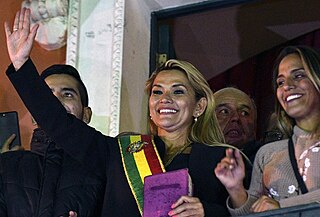
A political crisis occurred in Bolivia on 10 November 2019, after 21 days of civil protests following the disputed 2019 Bolivian general election in which incumbent President Evo Morales was initially declared the winner. The elections took place after a referendum to amend the Bolivian constitution, which limits the number of terms to two, was rejected in 2016. In 2017 under political pressure and a legal demand from the Morales government, the Constitutional Tribunal (TCP) ruled that all public offices would have no term limits despite what was established in the constitution and allowing Evo Morales to run for a fourth term.

The 2019–2020 Mexico–Bolivia diplomatic crisis began on 29 October 2019 when the Mexican government congratulated incumbent Bolivian President Evo Morales for his reelection victory. After the election, a preliminary report by the Organization of American States on 9 November reported numerous irregularities in the election, and amid protests and pressure from the Bolivian armed forces and police, Morales was forced to resign.

The 2021 Bolivian regional elections were held on 7 March 2021. Departmental and municipal authorities were elected by an electorate of approximately 7 million people. This was the third regional election under the 2009 constitution. It was postponed from the expected date of 2020 due to the 2019 Bolivian political crisis and delays in holding the 2020 Bolivian general election. All elected authorities assumed office on 3 May.
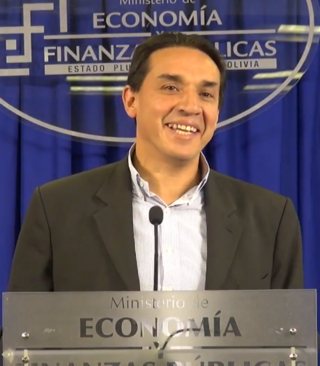
Mario Alberto Guillén Suárez is a Bolivian industrial engineer, lawyer, and politician who served as Minister of Economy and Public Finance from 2017 to 2019 during the administration of Evo Morales. Prior, he was Vice Minister of Pensions and Financial Services from 2009 to 2017 and served as the general manager of the Union Bank in 2019.

The cabinet of Jeanine Áñez constituted the 220th and 221st cabinets of the Plurinational State of Bolivia. It was initially formed on 13 November 2019, a day after Jeanine Áñez was sworn-in as the 66th president of Bolivia following the 2019 political crisis, in which the ruling Movement for Socialism government resigned. A second cabinet was formed on 28 January 2020 with all but three ministers being ratified in their positions.

Bolivia-Venezuela Relations are the existing bilateral relations between the Plurinational State of Bolivia and the Bolivarian Republic of Venezuela. Both nations established their diplomatic relations on 14 September 1883, during the government of the President of Bolivia Narciso Campero Leyes and the government of the President of Venezuela Antonio Guzmán Blanco.

Martha Yujra Apaza is a Bolivian politician and trade unionist who served as minister of cultures and tourism from 2019 to 2020. A prominent trade union leader in El Alto, Yujra was the only indigenous member of the Jeanine Áñez Cabinet and was the final official to head the Ministry of Cultures and Tourism; the institution was abolished during her term. During her tenure, Yujra's office primarily dealt with the effects of the COVID-19 pandemic on the cultural sector, devising means of alleviating the economic ramifications of quarantine measures on artisans and entertainers. She subsequently served as a counselor at the Embassy of Bolivia in Quito from July to November 2020. Prior to serving as minister, Yujra gained notoriety for her fierce opposition to the government of Evo Morales. In 2017, she led a breakaway faction of the pro-government El Alto Regional Workers' Center. As its executive secretary, Yujra aligned the union with the Bolivia Says No alliance, running unsuccessfully to represent La Paz in the Chamber of Deputies in the annulled 2019 general elections.
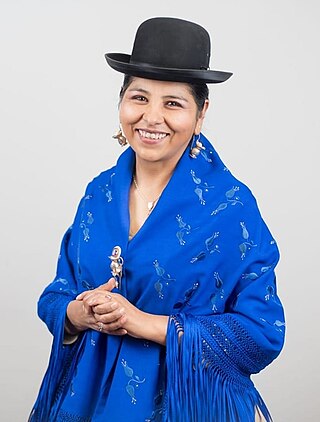
Bertha Beatriz Acarapi is a Bolivian politician and former television presenter serving as a party-list member of the Chamber of Deputies from La Paz since 2020. A member of the Movement for Socialism, she previously served as an El Alto municipal councillor from 2000 to 2004 on behalf of the Revolutionary Left Movement and from 2004 to 2010 on behalf of Plan Progress for Bolivia. During her second term, she served as president of the El Alto Municipal Council from 2006 to 2007, becoming the first woman to assume that post. Outside of politics, Acarapi's lengthy career in radio and television journalism led her to join ATB in 2015, becoming one of the country's first high-profile chola indigenous presenters.
María Magdalena Cajías de la Vega is a Bolivian academic, historian, and politician who served as minister of education from 2007 to 2008. Cajías spent most of her professional career teaching history at the Higher University of San Andrés, in addition to holding a number of consultancy posts for intergovernmental organizations and government bodies. She authored multiple published historical titles, focusing on the fields of women's and labor history. In 2006, Cajías was brought on as a consultant for the Ministry of the Presidency before being appointed to head the Ministry of Education the following year. After a brief return to academia following the conclusion of her ministerial term, Cajías returned to public administration as consul general in Santiago, where she served from 2014 to 2019. In 2021, she was named as a member of the editorial board of the Bolivian Bicentennial Library.
